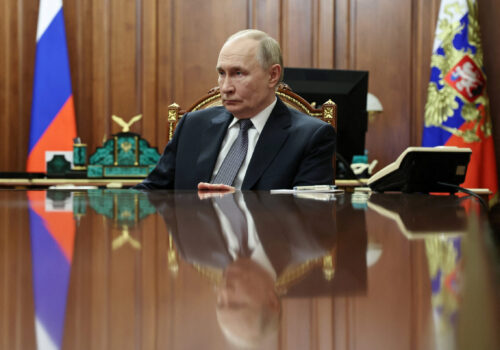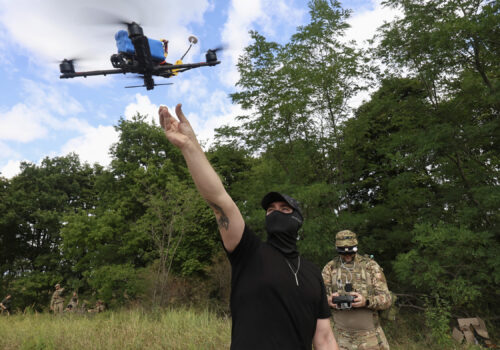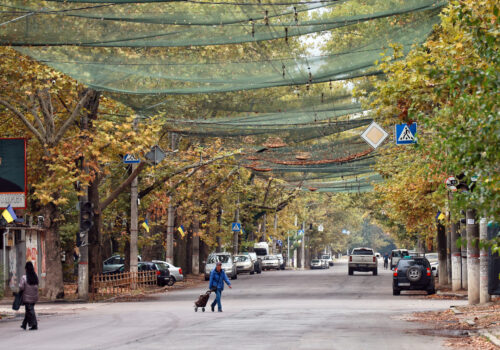A comparative assessment of the Russian and Ukrainian wartime economies underlines that Russia’s ongoing invasion has imposed far greater costs on Ukraine by depleting its manpower, worsening its demographics, and straining the country’s financial resources. Sustained support for the Ukrainian economy is therefore crucial as Europe and the United States seek to push Putin toward the negotiating table.
American and European security interests remain closely tied to Ukraine’s survival as an independent, democratic state anchored within the Euro-Atlantic community. This will require a combination of economic and military support for Ukraine along with tougher Western sanctions on Russia.
Western sanctions and military assistance to Ukraine have undoubtedly inflicted significant damage on the Russian economy, leading to an outflow of skilled labor, deepening technological isolation, growing Russian dependence on China, and other negative trends. However, Russia’s far larger population, considerable economic resources, and vast fossil fuel reserves have allowed the Kremlin to keep the war going.
While recent US sanctions on two Russian energy giants mark an important step forward in efforts to pressure Putin, their immediate impact is limited as China and India are unlikely to stop buying Russian oil. Moreover, sanctions alone will not force Putin to abandon an invasion that he regards as central to his entire reign.
The coming fourth winter of the war will arguably be Ukraine’s most arduous since the full-scale invasion began in February 2022. Ukraine faces a constant barrage of Russian missiles and drones, along with a persistently worsening economic outlook and acute manpower crisis on the front lines. Russian President Vladimir Putin is confident that he can wear down Ukrainian military and civilian resistance, and is also counting on Western support to dwindle.
The war is now as much a test of economic endurance as it is a military struggle. The United States and Europe should be under no illusions that Putin is unlikely to compromise on Ukraine unless he is forced to accept that continuing the war will be prohibitively costly.
The Kremlin dictator’s intransigence was underscored by a recent US intelligence assessment stating that he is more determined than ever to prevail. This makes it even more important to underline the West’s own unwavering determination to continue supporting Ukraine economically as well as militarily.
Stay updated
As the world watches the Russian invasion of Ukraine unfold, UkraineAlert delivers the best Atlantic Council expert insight and analysis on Ukraine twice a week directly to your inbox.
To effectively support Ukraine, Washington and Brussels need to move beyond short-term crisis responses and embrace a longer term strategy. The goal should be to help Ukraine strengthen its wartime economy and put the country in a position to continue military operations throughout 2026 and beyond.
The most pressing issue is removing obstacles to the use of immobilized Russian assets. Before the end of 2025, EU leaders must resolve internal disagreements that are currently preventing Europe from utilizing these frozen assets to cover large gaps in Ukraine’s budget for the coming year.
Plans for a $160 billion reparations loan have so far been blocked by Belgium over concerns of retaliatory Russian lawsuits and other potential Kremlin countermeasures. In order to minimize the threat, Belgium wants all EU member states to offer political guarantees for the loan. One option is to have Norway step up as guarantor, but Oslo has so far refused to take on that role alone. The United States could use its influence and leverage to offset European concerns. Alternatives to the reparations loan are subpar and would signal a weakening of Western resolve to Moscow.
Any breakthrough on the issue of immobilized Russian assets would set the stage for a proposed “mega deal” that would see Ukraine purchase large quantities of arms from the United States using $90 billion backed by European partners. Washington’s weapons deliveries to Ukraine could also be accelerated by working with Brussels through the EU’s $170 billion Security Action for Europe (SAFE) funding mechanism. This kind of transatlantic coordination would ensure that Ukraine receives the weapons it so urgently needs while strengthening NATO’s industrial base.
Support for Ukraine’s energy sector will also be vital as Western partners seek to provide Kyiv with greater economic stability. The Kremlin has dramatically expanded domestic drone production over the past year, making it possible to increase the bombardment of Ukraine’s cities and energy infrastructure. This is leading to widespread blackouts that undermine Ukrainian morale while impacting economic activity and military production.
Brussels must do more to persuade EU member states including Romania and Slovakia to lift existing restrictions on gas exports to Ukraine. This would help Kyiv cover energy supply shortfalls. Increased funding is equally crucial. Energy experts currently estimate that it will take $2.5 billion for Ukraine to import enough gas to get through the coming winter heating season. Meanwhile, the US and EU should take steps to encourage investment in Ukraine’s energy security to help repair, replace, and upgrade critical infrastructure.
Eurasia Center events

As Russia’s full-scale invasion approaches the four-year mark, policymakers in Washington, London, and across the EU must recognize that strengthening Ukraine’s wartime economy is a top strategic priority. Ukraine’s economic resilience will shape the outcome of the war and help determine European security for decades to come.
Funding Ukraine is expensive, but the arguments in favor of such an investment are convincing. After all, the cost of supporting the Ukrainian economy today would be dwarfed by the far higher price Western governments will have to pay in terms of increased defense spending if Putin’s invasion succeeds.
At present, there is little reason to believe a just and lasting peace is close. Ukraine is suffering on the battlefield, while the credibility of the country’s leadership has been seriously undermined by the largest domestic corruption scandal of the wartime period. Nevertheless, the public mood across Ukraine remains defiant and determined. In Russia, Western sanctions and Ukrainian airstrikes are causing real pain for Putin’s wartime economy, but his fixation on establishing political control over Ukraine far outweighs his need to address these mounting costs.
The United States and Europe must adopt a long-term perspective to effectively counter Moscow’s maximalist aims. Current efforts to broker a hasty peace deal risk emboldening Putin, sacrificing Ukrainian sovereignty, and compromising European security. Instead, Western leaders should send a clear message to the Kremlin that their own resolve is as strong as ever. Taking steps to strengthen Ukraine’s economic resilience would certainly underline this message, and could help to convince Putin that his hopes of outlasting the West are futile.
Zahar Hryniv is a Young Global Professional at the Atlantic Council’s Eurasia Center.
Further reading
The views expressed in UkraineAlert are solely those of the authors and do not necessarily reflect the views of the Atlantic Council, its staff, or its supporters.

The Eurasia Center’s mission is to enhance transatlantic cooperation in promoting stability, democratic values, and prosperity in Eurasia, from Eastern Europe and Turkey in the West to the Caucasus, Russia, and Central Asia in the East.
Follow us on social media
and support our work
Image: IMAGO/Sven Simon via Reuters Connect





